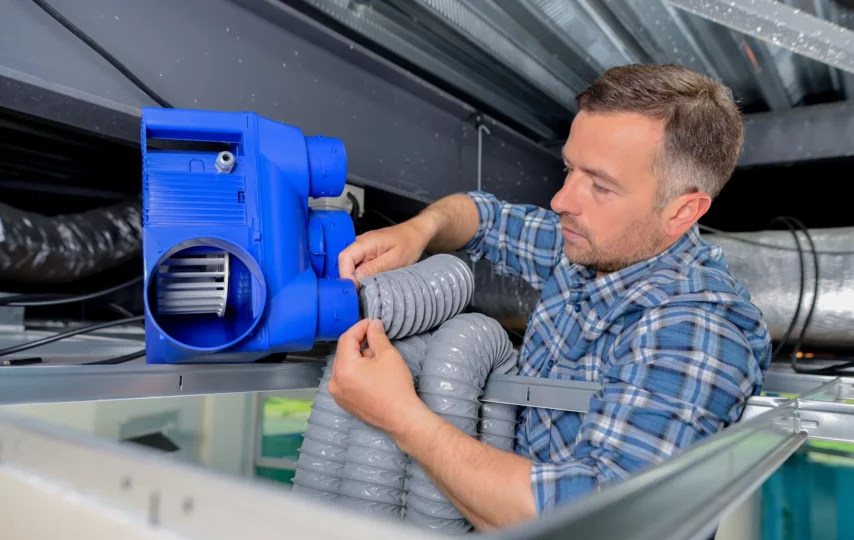Keeping your home temperature and air quality comfortable is important for your health, but it can also have a huge impact on your HVAC system’s efficiency. If you want to lower your energy bills and reduce wear and tear on the system, finding the right air filter is key! In this article, we’ll look at why air filters are essential for HVAC systems and how to select the best one for your needs.
Introduction to HVAC Systems and Air Filters
Most homes and businesses have some form of heating, ventilation, and air conditioning (HVAC) system to ensure the indoor air quality is comfortable. Though we often take our HVAC for granted, it’s important to keep these systems running smoothly and efficiently— especially during the hotter summer months and the colder winter season. One way to help your HVAC system run more efficiently is by regularly replacing the air filter.
But with all the different types of air filters on the market, how do you know which one is right for your HVAC system? In this blog post, we’ll introduce you to the basics of HVAC systems and air filters so that you can make an informed decision when it’s time to replace your home or office’s air filter.
An HVAC system works to circulate cooled or heated air throughout a space. The three main components of most residential and commercial HVAC systems are furnaces or boilers (for heating), evaporator coils (for cooling), and ductwork that distributes conditioned air throughout the building via vents.
The purpose of an air filter is to remove airborne contaminants from the circulated air before it enters into the ductwork. By trapping these particles, like dust, pollen, mold spores, smoke, pet dander, and more, an air filter helps improve indoor air quality while also protecting your HVAC system from potential damage. Air filters are typically made
Types of Air Filters
There are four main types of air filters: mechanical filters, activated carbon filters, ozone generators, and electronic air purifiers.
Mechanical filters are the most common type of air filter. They work by trapping particles in a mesh or screen. The mesh can be made of different materials, including paper, cloth, or metal. The size of the openings in the mesh determines how many particles can be trapped. The smaller the opening, the more efficient the filter will be at trapping particles.
Activated carbon filters are made of charcoal that has been treated with oxygen to open up pores between the carbon atoms. This makes it more effective at absorbing pollutants and odors than mechanical filters. Activated carbon filters must be replaced regularly because they eventually become saturated and stop working effectively.
Ozone generators produce ozone gas, which is a powerful oxidizing agent. Ozone gas reacts with pollutants in the air to break them down into harmless compounds. Ozone generators are not as effective as other types of air purifiers at removing particulates from the air, but they are very good at removing odors.
Electronic air purifiers use an ionizer to charge particles in the air so that they are attracted to an oppositely charged collector plate. This type of air purifier is very effective at removing particulates from the air but can produce ozone gas as a by-product.
Benefits of Installing the Right Air Filter and Maintaining It
Installing the right air filter in your HVAC system is vital to its efficiency. 20x23x1 air filters help to reduce the amount of chemicals that are released into the environment from your HVAC system. A properly sized and rated air filter helps trap dirt, dust, and other airborne particles before they enter your HVAC system. This not only protects your system from damage, but also helps it run more efficiently.
Maintaining your air filter is just as important as installing the right one. Clogged or dirty filters can restrict airflow and reduce efficiency. Be sure to check and clean your filter regularly according to the manufacturer’s instructions.
What to Consider When Purchasing an Air Filter
When it comes to improving your HVAC system’s efficiency, one of the most important things to consider is the type of air filter you install. There are a variety of factors that come into play when deciding which air filter is right for you, such as the specific needs of your HVAC system, the size of your home, and the area you live in.
If you’re not sure which air filter is right for you, it’s always a good idea to consult with a professional. Here at AirFilters.com, we have a team of experts who can help you select the perfect air filter for your needs. Just give us a call or send us an email and we’ll be happy to assist you.
How to Install a New Air Filter and Clean/Maintain It
Assuming you have purchased the correct size and type of air filter for your HVAC system, installation is a relatively easy process. In most cases, you simply need to remove the old air filter and insert the new one in its place. Make sure the new filter is inserted in the correct direction so that air can flow through it properly. Once the new filter is in place, close up your HVAC unit and turn it on.
You should clean or replace your air filter every 1-3 months, depending on how often you use your HVAC system and the type of air filter you have. To clean a reusable air filter, simply remove it from your HVAC unit and rinse it off with warm water. Let it dry completely before putting it back in place. If you have a disposable air filter, simply throw away the old one and insert a new one in its place.
Conclusion
Proper air filter maintenance is an important part of keeping your home comfortable and healthy. By investing in the right air filter for your system, you can help improve the efficiency and effectiveness of your HVAC system. In addition to improved performance, a new or improved air filter can also provide additional benefits such as cost savings and improved energy efficiency. So if you want to ensure that your HVAC system runs at its optimum levels all year round, start by installing the right kind of air filter!








